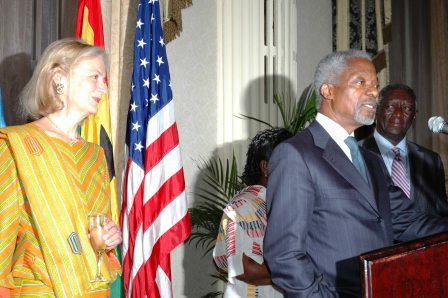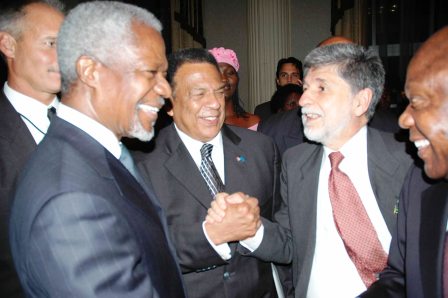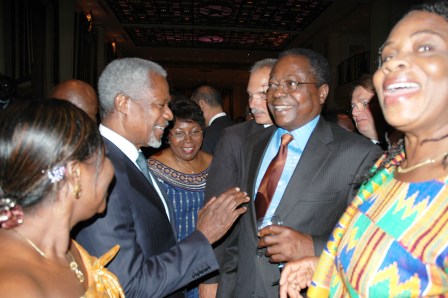|
Farewell to the
Secretary-General
E. Ablorh-Odjidja
January 03, 2007
For generations to come, and
especially for Africans, the name Secretary-General will
perhaps attach mostly to one person, Mr. Kofi Annan.
He served as the
Secretary-General of the United Nations and retired
after his ten-years term on December 31, 2006.
Whether historians will recognize
Mr. Annan as one of the greatest Secretary Generals of
all times or not remains to be seen. But those around
today should note immediately that none of his
predecessors experienced half the difficulty that faced
Mr. Annan during his term in office.
Mr. Annan’s term was the most
turbulent – from wars to natural disasters. But he saw
it all through with the coolness that some said was at
the core of his character.
First, there was the Iraq crisis
of 2003. Before this, Mr. Annan was deemed by most as a
very popular world citizen. And even with what seemed
like a hostile US President Bush administration in
office, he was awarded the Nobel Peace prize in 2001.
But soon things began to change
in Mr. Annan’s orderly world.
The key difficulty during this time came under
the guise of the “Oil for Food” scandal and he almost
fell victim to it.
The “Oil for Food” policy” was in
place in 1996, and was supervised by the UN to allow
defeated Iraq to sell some of its oil for food.
By mid-May 2004, the food
program’s supervision had become a full scandal.
Mr. Annan’s opponents in the US
administration at the time, who had grudges against him
for opposing the 2003 war with Iraq at the start, were
not deterred by the glowing tributes he had garnered so
far.
Instead, they chose to use the food scandal as a
retrospective excuse to call for his immediate ouster.
The Wall Street Journal editorial
of November 17, 2004, read as follows:
“(A) United Nations that allowed
Saddam Hussein to embezzle at least $21.3 billion in oil
money during 12 years, with the great bulk of that
sum--a staggering $17.3 billion--pilfered between
1997-2003, on Mr. Annan's watch…”
The Wall Street editorial
must have known
when the die
for his supposed ouster was cast.
A Dr. Nile Gardiner, writing for
the Heritage Foundation’s website, said that Mr. Annan’s
“failure of leadership relating to the U.N.’s
administration of the Oil-for-Food program .. cast
serious doubt over his suitability to remain in office
while the scandal is investigated.”
Of course, the case against Mr.
Annan was staged by those who wanted to punish him for
his reluctance to go along with the effort to oust
Saddam Hussein from power.
So, instead of a serious look at a flawed concept
that the UN Security Council had hatched, namely the
“Oil for Food” program, Mr. Annan became the scapegoat
and the target.
The program had its beginning in
1991, some five years before Mr. Annan was appointed the
Secretary-General. It came when the UN got apprehensive
about the worsening humanitarian situation in Iraq after
Gulf War I.
Under the “Oil for Food” program,
Iraq was permitted to sell some oil to meet pressing
humanitarian needs. A major portion of the revenue, 59%
to be exact, was to go to the government of Iraq for
essential supplies.
“It was the basic assumption that
Iraq – not the United Nations – would choose its (Iraq)
oil buyers,” said the Volcker committee, which was
appointed to look into the scandal, in a report in
October 2005.
Assumption or not, it was Saddam
Hussein who manipulated the program to his advantage.
The result, as the Volcker committee said, was that he
“selected oil recipients to influence foreign policy and
international opinion.”
The report, unfortunately, did
not ask why the UN Security Council allowed itself to
commit such a blunder. Or why it designed a chicken coop
and chose a fox-like Saddam to guard it!
Instead of blaming the UN
Security Council, it became sufficient for Mr. Annan’s
detractors to assume that Mr. Annan was the designer in
chief of the program for his benefit, and perhaps those
of a few cronies.
In reality, the intent to
prosecute Chief Annan had a different origin, one that
in cases like this was not openly mentioned.
As a chief spokesperson for the
UN, Mr. Annan had come out against the pending 2003 Iraq
war, with a strong anti-war sentiment that was too
uncomfortable for the Bush administration because it was
close to the presidential re-election of 2004.
Mr. Annan’s anti-war expression
went against the political sentiment of an
administration that was anxious to punish Saddam for the
9/11 crime, for fame and for possessing "weapons of mass
destruction.
And soon, the bad press started
rolling and the intensification of the cries for his
resignation mounted in earnest.
Mr. Annan became fodder for the US ideological
rivalry. The “Oil for Food” crisis was the
retrospective excuse.
Why a UN Secretary-General should
not want war would be an oxymoron question to ask. But
some did ask. Surprisingly, somebody forgot to point out
to them what the UN stood for.
The UN was established to resolve
conflicts between nations.
Whether for war or peace, the Secretary-General,
in this case, Mr. Annan, should be allowed the
flexibility to wage either.
How a Secretary-General came out
of any situation of such belligerence, either for peace
or war, ought to be the litmus test of his success or
failure in office at the UN.
The mess and the lies exposed, of
the Bush administration after the Iraq war, ought to
show that Mr. Annan was rather prophetic and wise for
going against it and for promoting caution.
No matter how much nations
profess peace, there are bound to be differences at the
UN, some pushing for war and others for peace.
But there is the Security Council within the UN,
with the power to override any proposal for war or
peace; that often have had crippling effects
on world peace.
Exemplar cases are the ongoing
conflicts in Somalia, Darfur, Sudan, and this “Oil for
Food” program under which Mr. Annan has just been
crucified.
Instead of looking to the
Security Council for blame, Mr. Annan’s opponents wanted
to put it on him.
The same permanent powers at the Security
Council who had approved the handling of the “Oil for
Food’ program - France, Britain, and Russia - had
supported entities that aided Saddam to hoodwink the UN.
Yet the same wanted to blame
Secretary-General Annan.
In truth, Mr. Annan affirmed the
usefulness of the “Oil for Food” program as “the only
humanitarian programme ever to have been funded entirely
from resources belonging to the nation it was designed
to help.” He had
said so in a statement to the Security Council on
November 20, 2003.
He also added that the program
had “an almost impossible series of challenges."
He was right in
his description. But perhaps, he should have gone
further to point the blame at the Security council.
Significantly, Mr. Annan was
spared by the Volcker committee. Could the whole
scandal have been an attempt to hurt the glorious legacy
he had achieved during his first term?
Many statesmen, looking at Mr.
Annan’s career and his relationship with the UN, portray
him as a skilled bureaucrat and a believer in the UN
system.
The BBC in a profile about him
must have found Mr. Annan’s core belief when it reported
Mr. Annan’s claim that the “UN should act on behalf of
not just the major powers but all states.”
Mr. Annan was right.
And with the strength of character, he held on to
this belief to the end of his official term.
E. Ablorh-Odjidja, Publisher,
www.ghanadot.com, Washington, DC, January 03, 2007.
Permission to publish: Please
feel free to publish or reproduce, with credits,
unedited. If posted on a website, email a copy of the
web page to publisher@ghanadot.com. Or don't publish at
all.
Back to
commentary page
|









